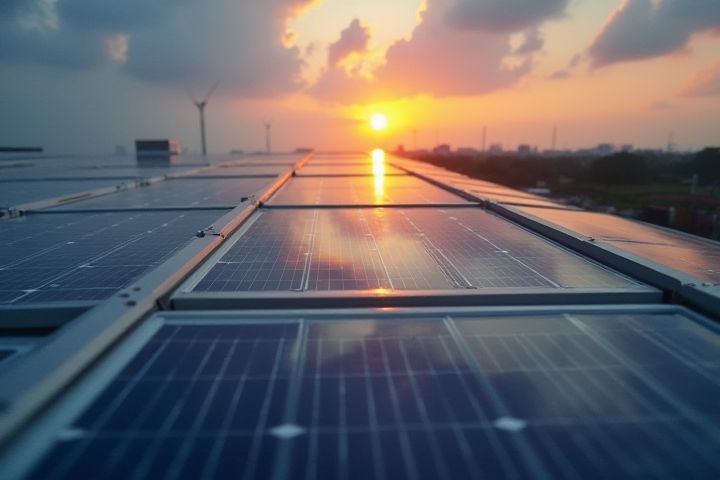
Nigeria's energy policy focuses on diversifying energy sources to ensure sustainable development and economic growth. The National Renewable Energy and Energy Efficiency Policy (NREEEP) aims to harness the country's abundant renewable resources, such as solar, wind, and hydroelectric power, to reduce reliance on fossil fuels. The government seeks to increase electricity access, targeting millions of Nigerians who currently lack reliable power supply. Investment in off-grid solutions and partnerships with private sectors are key components driving this transformation. Influencing your energy consumption habits can contribute to the broader goal of achieving universal energy access by 2030.
Nigeria's Energy Transition Plan
Nigeria's Energy Transition Plan emphasizes a pathway to sustainable energy, aiming to achieve net-zero greenhouse gas emissions by 2060. The plan prioritizes the development of renewable energy sources, including solar, wind, and hydropower, to diversify the energy mix and enhance energy security. Investments in energy efficiency and infrastructure, alongside fostering local manufacturing capabilities, are essential components of this strategy. By aligning with global climate goals, Nigeria seeks to ensure reliable, affordable energy access while stimulating economic growth and addressing the impacts of climate change.
Gas utilization and development strategy
Nigeria's energy policy emphasizes the strategic utilization and development of natural gas, aiming to position the country as a leading player in the global gas market. The government is investing in infrastructure to enhance gas processing and transportation, which is crucial for both domestic energy needs and export opportunities. The adoption of gas-fired power plants is central to improving electricity supply, reducing reliance on hydrocarbon sources, and minimizing environmental impacts. By leveraging its rich gas reserves, Nigeria seeks to foster economic growth, create jobs, and ensure energy security for its population.
Electricity sector privatization
Nigeria's energy policy prioritizes the privatization of the electricity sector to enhance efficiency and improve service delivery. By transferring state-owned assets to private entities, the government aims to attract investment, foster competition, and reduce widespread power shortages. The deregulation initiative has opened opportunities for independent power producers and renewable energy projects, facilitating a shift towards sustainable energy sources. As a result, you can expect a gradual improvement in the reliability and quality of electricity supply across the country.
Power generation mix diversification
Nigeria's energy policy emphasizes the diversification of its power generation mix to enhance energy security and sustainability. The country aims to integrate renewable energy sources, such as solar, wind, and hydroelectric power, alongside traditional fossil fuels like natural gas and oil. This strategic approach not only seeks to reduce reliance on a single energy source but also aims to promote sustainable economic growth and increased access to electricity for all Nigerians. By fostering an inclusive energy transition, your investment in the sector can contribute to a more resilient and environmentally friendly energy landscape.
Renewable energy targets
Nigeria's energy policy emphasizes the transition to renewable energy sources to meet its growing power demand and combat climate change. With a goal to generate 30% of its electricity from renewable sources by 2030, the country is leveraging its abundant solar, wind, and hydropower resources. Key initiatives include the Solar Power Project which aims to provide electricity to off-grid communities, enhance energy access, and stimulate economic growth. By positioning itself as a leader in renewable energy in Africa, Nigeria seeks to attract investments and achieve energy sustainability for its population.
Petroleum Industry Act
Nigeria's Energy Policy emphasizes the Petroleum Industry Act (PIA), which aims to reform the oil and gas sector to attract investment while ensuring sustainability. The PIA introduces transparency measures, improves revenue management, and enhances regulatory frameworks, addressing longstanding challenges in the industry. By promoting local content and environmental protection, the act supports both economic growth and social responsibility. Understanding the implications of the PIA is essential for stakeholders seeking to navigate Nigeria's evolving energy landscape.
National Energy Policy
Nigeria's National Energy Policy aims to create a sustainable and efficient energy sector that supports economic growth and environmental protection. This comprehensive framework includes strategies for expanding access to electricity, increasing renewable energy adoption, and improving energy efficiency across various industries. The policy also emphasizes the importance of energy security, promoting investment in both traditional and alternative energy sources to meet rising domestic demand. As a consumer or investor, understanding these policy directions can guide your decisions in the evolving Nigerian energy landscape.
Rural electrification initiatives
Energy policy in Nigeria emphasizes rural electrification initiatives to enhance energy access in underserved communities. The government collaborates with private investors and international organizations to deploy renewable energy solutions, such as solar energy systems, to ensure sustainable power supply. Innovative financing models, including microfinance and community-based cooperatives, are being introduced to promote local participation in energy projects. These efforts aim to improve the quality of life for rural residents by enabling economic activities and access to essential services.
Subsidy removal and impact
Nigeria's energy policy emphasizes the removal of fuel subsidies, a critical step toward achieving a more sustainable economy. This shift is aimed at redirecting government funds toward developing renewable energy sources and improving infrastructure, which can enhance energy access across the nation. The removal of subsidies may lead to short-term increases in transportation and living costs, but it is expected to stabilize the economy in the long run by attracting foreign investment. By prioritizing a market-driven approach, you can contribute to a cleaner, more efficient energy sector that promotes economic growth and environmental sustainability.
International energy partnerships
Nigeria's energy policy emphasizes forging international partnerships to enhance its energy sector's efficiency and sustainability. The country collaborates with global organizations and countries to attract investments, share technological innovations, and improve infrastructure. By aligning with international standards and best practices, Nigeria aims to diversify its energy mix, integrating renewable sources alongside traditional fossil fuels. These strategic alliances not only boost domestic energy security but also position Nigeria as a key player in the global energy market.
